We’re celebrating Mythic Championship II London with some awesome fantasy tournaments on Thousand Leagues! You could win a Guilds of Ravnica Mythic Edition or some sweet Hipsters gear—and as always, you can make your own league and invite some friends!
Welcome back everyone! Over the course of the last couple weeks I’ve been testing quite a bit of Modern for Mythic Championship II London, and there have been some sizable changes since the last major Modern tournament. Chances are that unless you’re a Modern diehard, the format has taken a back seat for you since the London mulligan was introduced to Magic Online. The London mulligan and the public deck list rules, which I covered last week, cause some unexpected cards get much better going into the Mythic Championship.
Let’s talk about them.
Cards That Gain Value with the London Mulligan
The first group of cards are those that generally get more powerful once the London mulligan rule is introduced.
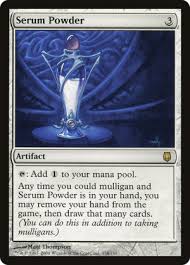
Serum Powder is a card with a very strange design: it wants you to mulligan. Magic players aren’t too thrilled when having to mulligan because it means starting with less cards than your opponent in most scenarios. However, this unassuming three-mana colorless mana rock lets you exile your hand and start with the same number of cards!
The card is not new, so why was no one playing it before? Under previous mulligan rules, Serum Powder became harder to find as you mulliganed, increasing the risk that you’d draw it during the game instead of having the option to exile it. With the London mulligan you always get to look at seven cards to try and find your Serum Powder in search of sculpting a perfect hand. Expect to see this one primarily in Colorless Eldrazi, but possibly even the Narset combo deck!
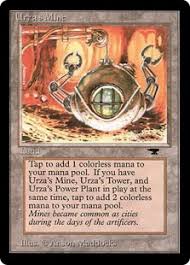
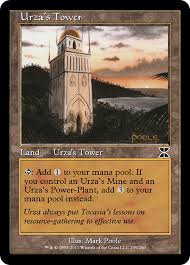
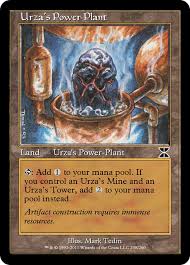
Tron was already a very strong deck under previous mulligan rules, so why does it make this list you might ask? Simply put, Tron gets better with additional access to the Tron lands. The deck is built to find all of these pieces quickly, but inconsistencies with mulligans or drawing too many of the same piece plagued Tron in the past. With the London mulligan rule I’ve seen Tron pilots mulligan down to as few as three cards and win the game with ease.
Tron’s business spells are so powerful that it can afford to play off the top of the deck. Keeping a hand of something like Urza’s Tower, Urza’s Mine, and Expedition Map will have a strong chance against anything but the fastest combo decks.
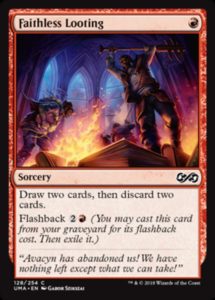
Faithless Looting seems like an odd inclusion on this list because it operates at card disadvantage; but trust me, it gets much better. Under the previous mulligan rule, you don’t have any control the cards you keep in hand alongside Faithless Looting after a mulligan. With the London rule you can sculpt your hand to be able to discard Stinkweed Imp, Arclight Phoenix, or Griselbrand as early as turn one without hoping to find it off of the Faithless Looting draws.
Phoenix and Dredge were already quite consistent. This change bolsters what is often regarded as their greatest strengths while fixing some of the crippling issues that other Faithless Looting decks faced.
Mulligans to Find Single Cards
Cards that can win the game a high percentage of the time when found in your opening hand get much better under the London mulligan rule.
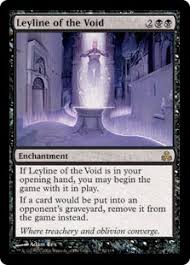
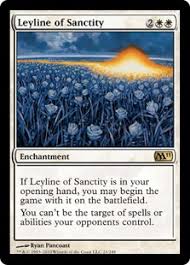
There are many more Leylines than just Leyline of the Void and Leyline of Sanctity, but these are the two that show up frequently in competitive play that I would expect to see in London. Leyline of the Void provides powerful and immediate graveyard hate against top decks like Izzet Phoenix and Dredge. Leyline of Sanctity on the other hand is an excellent tool for decks to protect themselves from discard spells often coming out of combo decks, and to protect slower decks against burn spells.
The primary issue with Leylines in the past was that, as you mulligan more aggressively looking for one, your hands tended to become less functional while having a lower percentage to actually find it. With the London mulligan you get to not only have a higher chance to find the Leyline, but also keep a more functional hand once you do.
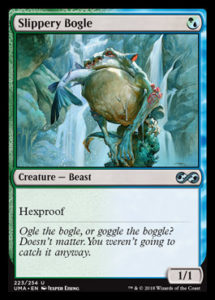
This little hexproof bugger has caused me many a headache in the past, and is certainly poised to continue its work. The Selesnya Bogles deck beats up on fair strategies by denying them the ability to interact. The downfall to this deck was traditionally that you had to mulligan until you found one of your eight hexproof creatures, but you also need lands and auras. The London mulligan takes a lot of the strain off your mulligans by making it easier to find arguably the most important piece, Slippery Bogle.
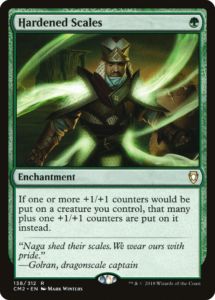
Hardened Scales has been the de facto Affinity deck for a little while now. It swaps out Cranial Plating for the powerful one-mana enchantment. When this deck starts with something like Hardened Scales into Arcbound Ravager, it is a force to be reckoned with. But with only four copies, the math does not favor finding one in your opening hand.
Having a lot of extra looks to find a copy of Scales to power up Arcbound Ravager and Walking Ballista. I expect this one to be quite popular in London.
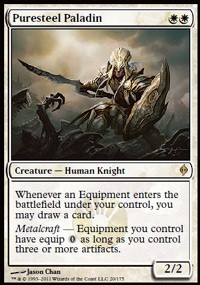
The Puresteel Paladin Cheerios deck was long thought to be a meme because it needs to have a copy of Puresteel Paladin or Sram, Senior Edificer in play to storm off and win. Much like Bogles, this deck doesn’t do anything as at all without one of its creatures. Unlike Bogles however this deck functions similarly to Storm by being a critical mass combo deck, so mulligans in general hurt this deck as you need to assemble a creature, two lands, and equipment to get the ball rolling. If this deck shows up in London it is because it is one of the biggest gainers from this rule.
Cards That Benefit from Public Deck Lists
Now that we’ve finished talking about the cards that gain a lot from being able to find them more frequently, I’d like to talk about a group of cards that get better with public deck lists, which is something that seems to be flying under the radar.
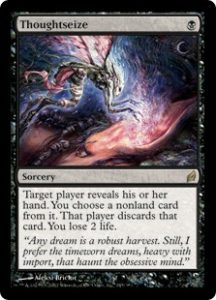
Thougthseize actually benefits from both the mulligan and the deck list rule because it gets to punish people mulling to specific cards, but also the timing is much easier to get right when you go into the match knowing what your opponent is playing. Having access to the knowledge of exactly what is in your opponent’s deck will let you sequence your early turns more easily. For example, you may look at your hand that is a little land light and decide to cast a cantrip to try and smooth things out, and end up losing to a fast combo deck. That is much less likely to happen when you know what you’re up against before the match begins.
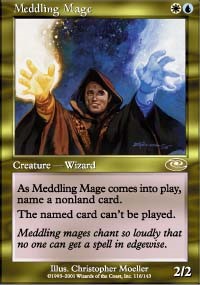
Meddling Mage may seem like an interesting inclusion here, but it makes a lot more sense when you know all of your opponent’s flex spots. Say for example you are playing against something like Azorius Control and you know your opponent likely has Terminus in their deck, but you don’t know if their secondary sweeper is Supreme Verdict or Settle the Wreckage. In many cases you have to guess, and in some of them guessing wrong could lose you the game. Well, now that choice becomes much easier to manage.
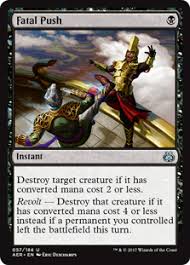
This spot could have gone to Fatal Push or Path to Exile, but I chose Fatal Push because it is often still a good card in mirror matches, while the same is frequently not true for Path to Exile. I can’t tell you the number of times I’ve looked at an opening hand in the dark for game one that contains two copies of Fatal Push and just had to hope that my opponent would have targets for them, only to see turn one Hallowed Fountain. Now I get to sit down and know that my opponent will either have a variety of targets, or very few, and keep or mulligan my hand appropriately.
Hopefully these insights will prove useful to you whether you’re playing in MC London or just playing Magic Online for the next week. That is all I have for this week’s Rapport, until next time.
Michael Rapp is a Boston-area grinder who started playing competitively in 2014. Loves Modern but plays everything. His favorite card is Thoughtseize has a soft spot for Tarmogoyf. GP Toronto 2019 Champion. Always happy to answer questions or just chat on Twitter or Facebook.

